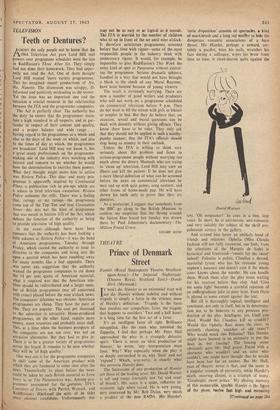Teeth or Dentures?
ALMOST the only people not to know that the ,ft1964 Television Act gave Lord Hill real powers over programme schedules were the trio in Rediffusion's Three After Six. They simply had not done their homework. They had appar- ently not read the Act. One of them thought' Lord Hill wanted 'more variety programmes.' This he imagined meant productions of No, No, Nanette. The discussion was scrappy, ill- informed and positively misleading to the viewer. Yet the issue was an important one and the occasion a crucial moment in the relationship between the ITA and the programme companies.
The Act is perfectly clear. The authority has the duty `to ensure that the programmes main- tain a high standard in all respects, and in par- ticular in respect of their content and quality, and a proper balance and wide range . . . having regard to the programmes as a whole and also to the days of the week on which, and also to the times of day at which, the programmes are broadcast.' Lord Hill may not know it, but a great ,many professionals on the programme- making side of the industry were watching with interest and concern to see whether he would have the determination to exercise these powers. What they thought might move him to action Was Riviera Police. This dear and nasty pro- gramme is apparently inspired by Continental Fihns, a publication rich in pin-ups which are a solace to tired television executives. Riviera Police animates the stills. There was a feeling that, ratings or no ratings—the programme came top of the Top Ten and beat Coronation Street—this was not the kind of programme that was meant in Section 1(3) of the Act, which defines the function of the authority as being to provide television 'of high quality.'
In the event—although there have been rumours that the authority has been looking a little askance at Riviera Police—it was the band of American programmes, Tuesday through Friday, which caused the authority to issue its directive to the companies and bring into the Open a quarrel which has been rumbling away for many months like a bad appendix. There Was never any suggestion that the authority Wanted the programme companies to cut down the 14 per cent quota of American material; What it •required was that the American tele- films should be redistributed and a larger num- ber of British programmes (not all concerned With crime) placed before the nine o'clock news. The companies' dilemma was obvious. American Programmes are cheap. They have the pace of film. They are popular. The cost per thousand to the advertiser is attractiVe. Home-produced Programmes, on the other hand, require more money, more resources and probably more staff. This, at a time when the business prospects of the companies are not too rosy, was not an attractive alternative. But they had to give in. There is to be a greater variety of programmes across the board. It remains to be seen whether they will be 'of high quality.'
One way out is for the programme companies to shift some of the American product with Which they are lumbered to some time after the news. Theoretically its place before the news could be taken by such British material as Love Story is, or The Planemakers was. Among pro- grammes announced for the ,,,autumn, ITV's Corridors of Power, with Patrick Wymark, and Rediffusion's Blackmail (in spite of its title) seem obvious candidates. Unfortunately this
may not be as easy or as logical as it sounds. The ITA is worried by the number of children who sit up in front of the set until nine o'clock. /It therefore scrutinises programmes screened before that time with rigour—some of the most responsible people in the industry think with unnecessary rigour. It would, for example, be impossible to give Rediffusion's This Week the same kind of spot as Panorama without castrat- ing the programme. Serious dramatic subjects, handled in a way that would not have brought a blush to the cheek of any Moral Rearmer, have been banned because of young viewers.
The result is extremely worrying. There are now a number of good writers and producers who will not work on a programme scheduled on commercial television before 9 p.m. They do riot want to fill the screen with girls in bikinis or couples in bed. But they do believe that, on occasion, sexual and moral questions can be dealt with decently without giving offence. They know there have to be rules. They only ask that they should not be applied in such a namby- pamby manner, that the ITA's officials should stop being so minney in their outlook.
Unless the ITA is willing to think very seriously about this problem and listen to serious-programme people without worrying too much about the dreary Maenads who are trying to 'clean up' television, Lord Hill may cure an illness and kill the patient. If he does not give a more liberal definition of what can be screened before the news on commercial television he may end up with quiz games, song contests. and other forms of home-made pap. He will have shown his teeth only to prove that they are dentures.
As a postscript, I suggest that somebody from the BBC go along to the British Museum to confirm my suspicion that the throng around the Sutton Hoo hoard last Sunday was drawn there by Paul Johnstone's documentary--The Million Pound Grave.
STUART HOOD






























 Previous page
Previous page